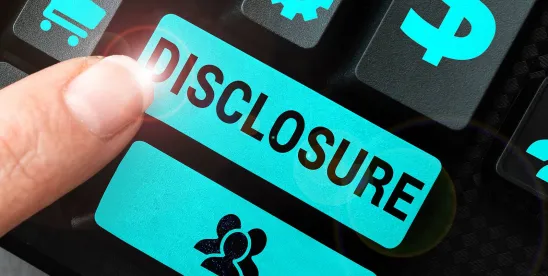Drawing on a carrot and stick approach, Department of Justice (“DOJ” or the “Department”) guidance in 2023 focused heavily on incentivizing companies to voluntarily self-disclose their misconduct. This guidance included the Criminal Division’s revised Corporate Enforcement Policy (the “CEP”), the United States Attorneys’ Offices Voluntary Self-Disclosure Policy (the “VSD Policy”), and the Safe Harbor Policy for voluntary self-disclosures made in connection with mergers and acquisitions (the “M&A Safe Harbor Policy”).[1]
Under this new policy framework, absent aggravating circumstances, companies that 1) voluntarily self-disclose their misconduct to DOJ, 2) fully cooperate with the ensuing investigation, and 3) timely and appropriately remediate, will receive the presumption of a declination. However, to obtain the benefits associated with voluntary self-disclosure, a company generally must provide original information that is not already known to the government.
The Pilot Program on Voluntary Self-Disclosures for Individuals
On April 15, 2024, the Criminal Division announced a new Pilot Program on Voluntary Self-Disclosures for Individuals (the “VSD Pilot Program for Individuals” or the “Pilot Program”) of criminal conduct involving corporations. The VSD Pilot Program for Individuals offers the prospect of a Non-Prosecution Agreement (“NPA”) to individuals that “bring to the Criminal Division’s and law enforcement’s attention actionable, original information about criminal conduct that might otherwise go undetected or be impossible to prove.”
At a high-level, the Pilot Program offers NPAs to individuals that 1) voluntarily self-disclose original information about certain types of criminal misconduct involving corporations, including the complete extent of their own role in the misconduct; 2) fully cooperate with the authorities; and 3) pay any applicable victim compensation, restitution, forfeiture, or disgorgement, including returning any ill-gotten gains.[2]
The specific eligibility requirements set forth in the VSD Pilot Program for Individuals are as follows:
- Reporting Channel: Disclosures must be made to the Criminal Division at NPA.Pilot@usdoj.gov.
- Original Information: The reporting individual must disclose original information, which is defined as non-public information not already known to any component of the Department.
- Applicable Violations: The information reported on must relate to one or more of the following categories of corporate misconduct:
- Violations by financial institutions, their insiders, or agents, including schemes involving money laundering, anti-money laundering, registration of money transmitting business, and fraud statutes, and fraud against or compliance with financial institution regulators
- Violations related to integrity of financial markets undertaken 1) by financial institutions, investment advisors, or investment funds, 2) by or through public companies or private companies with 50 or more employees, or 3) by any insiders or agents of any such entities;
- Violations related to foreign corruption and bribery, including violations of the Foreign Corrupt Practices Act, violations of the Foreign Extortion Prevention Act, and violations of the money laundering statutes;
- Violations related to health care fraud or illegal health care kickbacks committed by or through public companies or private companies with 50 or more employees
- Violations by or though public or private companies with 50 or more employees related to fraud against, or the deception of, the United States in connection with federally funded contracting, where such fraud does not involved health care or illegal health care kickbacks; and
- Violations related to the payment of bribes or kickbacks to domestic public officials.
- Voluntariness: The disclosure must be voluntary, meaning that:
- It is made before the individual receives any request, inquiry, or demand related to the subject matter of the disclosure from DOJ or another federal law enforcement, regulatory, or civil enforcement agency;
- The individual has no preexisting obligation to report the information; and
- The disclosure is made in the absence of any government investigation or threat of imminent disclosure to the government or public.
- Truthful and Complete Disclosure: The disclosure must be truthful and complete, meaning that the disclosing individual is required to provide all information he or she knows related to the misconduct, including the complete extent of the individual’s role, and all matters about which DOJ inquires.
- Full Cooperation and Assistance: The reporting individual must agree to fully cooperate with and, if necessary, provide substantial assistance to the Department in its investigation and prosecution of equally or more culpable individuals or entities. This effort may include providing testimony in interviews, before a grand jury, or at trial; producing documents, records, and other evidence; and working proactively with law enforcement officers and their agents.
- Monetary Requirements: The reporting individual must agree to forfeit or disgorge any profit from the criminal wrongdoing and pay restitution or victim compensation.
- Barred Individuals: The reporting individual cannot be a member of any of the following categories:
- One who has engaged in criminal conduct involving violence, use of force, threats, substantial patient harm, any sex offense involving fraud, force, or coercion, or relating to a minor, or any offense involving terrorism;
- The Chief Executive Officer (or equivalent) or Chief Financial Officer (or equivalent) of a company or the organizer/leader of the scheme;
- An elected or appointed foreign government official;
- A domestic government official at any level, including any employee of a law enforcement agency; and
- One who has a previous felony conviction or a conviction for conduct involving fraud or dishonesty.
Criminal Division prosecutors retain the right to offer an NPA to individuals who proactively come forward, but that fail to meet all of the above requirements in full, in accordance with the Justice Manual and other Criminal Division procedures.
DOJ has stated that it believes that the benefits offered to culpable individuals under the Pilot Program will incentivize companies to create compliance programs that incorporate robust internal reporting mechanisms which will “help prevent, detect, and remediate misconduct before it begins or expands” and “allow companies to report misconduct when it occurs.” The point here is that companies should want to have compliance programs in place to prevent or detect wrongdoing before an individual is incentivized under the Pilot Program to report it to DOJ, outside the company’s compliance channels.
Moreover, the Pilot Program, particularly when considered against the backdrop of other recent DOJ policy announcements, creates added pressure for companies that discover potential misconduct to rush to DOJ’s door and voluntarily self-disclose. In March, Deputy Attorney General (“DAG”) Lisa Monaco also previewed the development of a new Whistleblower Rewards Program, which will offer to financial incentives to certain whistleblowers (that were not involved in the misconduct reported on) who disclose original information to DOJ.[3] DAG Monaco explained that a “90-day sprint” is currently taking place to develop and implement the Whistleblower Rewards Program.
Upon finalization of the Whistleblower Rewards Program, in order to provide DOJ with original information, companies may have to race against both culpable employees seeking an NPA under the Pilot Program and non-culpable employees seeking the financial perks associated with blowing the whistle. In other words, by taking the time to conduct a thorough internal investigation regarding potential misconduct, companies will risk significantly reduced credit at the time of resolution, as one of their own employees may disclose the information first in an individual capacity.
The Pilot Program went into immediate effect on April 15, 2024. The Criminal Division intends to collect anonymized statistical data about the disclosures it receives to determine whether the Pilot Program should be extended or modified.
[1] Our more detailed analysis of these policies can be found here.
[2] The Pilot Program has many similarities to whistleblower programs announced earlier this year by the United States Attorneys’ Offices for the Southern District of New York and the Northern District of California.
[3] Our more detailed analysis of the planned Whistleblower Rewards Program can be found here.





 />i
/>i

